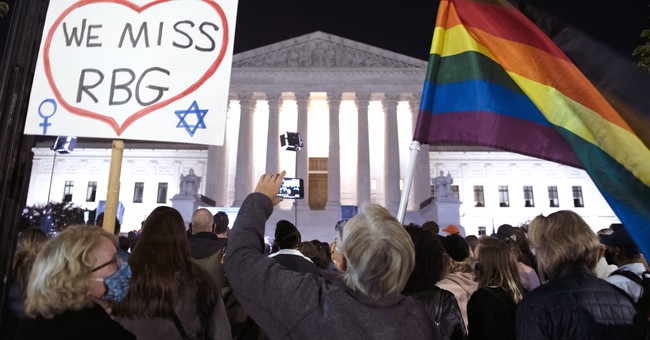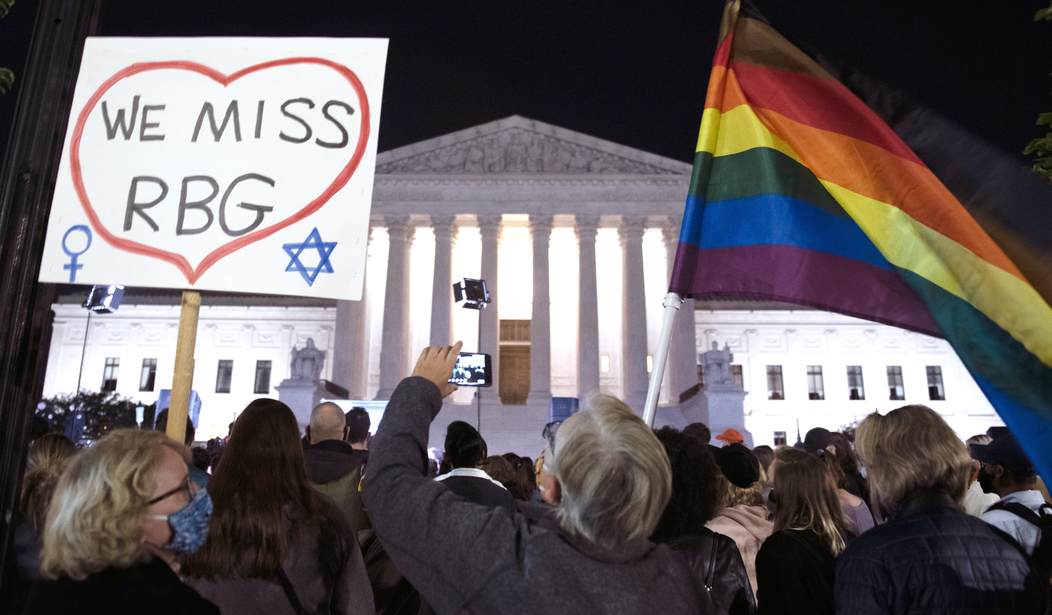
Democratic presidential nominee Joe Biden ventured out of his antiseptic bunker a few weeks ago just long enough to renew his vow of loyalty to a favorite special interest. At a Labor Day event staged by the AFL-CIO, Biden dutifully read comments from his teleprompter in which he promised to become the “strongest labor president you’ve ever had.”
Meanwhile, Justice Ruth Bader Ginsburg — who could similarly claim the title of organized labor’s best friend on the U.S. Supreme Court — passed away.
But not before allegedly expressing a deathbed request that her successor be chosen by some other president than the one duly elected by the voters in the most recent general election.
Biden, of course, responded instantaneously by agreeing with her sentiments. By that Sunday, he had issued a statement saying, “There is no doubt — let me be clear — that the voters should pick the president, and the president should pick the justice for the Senate to consider.”
That the voters in the 2016 election did pick a president, and that Donald Trump — together with a GOP majority in the Senate — still has three and a half months to perform this duty is predictably irrelevant to Constitutional free-thinkers like Biden and Ginsburg.
And to their cronies in labor.
“Justice Ginsburg’s dying wish was for the next president to appoint her successor,” brayed Mary Kay Henry, president of the Service Employees International Union (SEIU), which had earlier pledged to spend at least $150 million to elect Biden.
“That wish must be honored,” she continued. “Anything less would be an affront to the Americans who expect to have a voice in their democracy, including the people who are already casting ballots. There can be no movement on a nominee to replace her enormous shoes before the next president is sworn in.”
Lee Saunders, president of the American Federation of Federal, County and Municipal Employees (AFSCME), the nation’s other major government employee union, was equally shrill.
“No Supreme Court justice should be nominated or confirmed until January 2021,” he pronounced. “To fill this seat … would be a corrupt, norm-breaking power grab without precedent in American history … The people’s rights are at stake, so the people should decide.”
Again, the people did decide. Remember? In 2016, they handed President Trump an overwhelming electoral victory that gives him the right to appoint new Supreme Court justices for as long as he’s in office.
Henry and Saunders, of course, can be forgiven for wanting to ignore that occasion and the consequences of it. In 2018 — with Neil Gorsuch installed on the court instead of a Hillary Clinton appointee, Ginsburg found herself on the wrong side of history when she voted with the minority in Janus v. AFSCME, a landmark labor reform case in which the court outlawed mandatory membership and dues, affirming the right of government employees to opt out of union participation and still keep their jobs.
As president, Biden has promised he would repay his union benefactors by personally repealing Janus and the right-to-work protections already on the books in 27 U.S. states.
But without a strong ally on the court, that promise becomes even emptier, as does Biden’s threat to repeal a recent rule change that prevents individual states from collecting dues on behalf of unions representing Medicaid-compensated homecare providers, whose right to opt out of union membership and dues was affirmed by the Supreme Court in 2014.
In an earlier statement, Saunders — the monopoly status of whose union Ginsburg unsuccessfully voted to preserve in Janus — ironically described Ginsburg as, “… a fierce warrior for justice who believed the law should be on the side of the people, not just the powerful.”
Two problems: First, unions in general, and government unions in particular, long ago became the powerful, and politicians and judges like Joe Biden and Ruth Ginsburg are never allowed to forget it.
Even more importantly, though, the oath of office for a Supreme Court justice, like that of the president, says nothing about settling scores and picking winners. It says “… preserve, protect and defend the Constitution.” Period. Full stop.
For a refreshing change, here’s hoping the current president will nominate and the Senate will promptly confirm someone whose commitment to that ideal is more than just lip service.
The seat does not belong to Justice Ginsburg, her family, or Big Labor; it belongs to the American people.
Justice Ginsburg understood this herself, saying in 2016, “(T)he president is elected for four years not three years, so the powers that he has in year three continue into year four and maybe some members of the Senate will wake up and appreciate that that’s how it should be.”
Ashley Varner is VP of Communications and Federal Affairs at the Freedom Foundation, a national non-profit dedicated to holding government unions accountable.













Join the conversation as a VIP Member